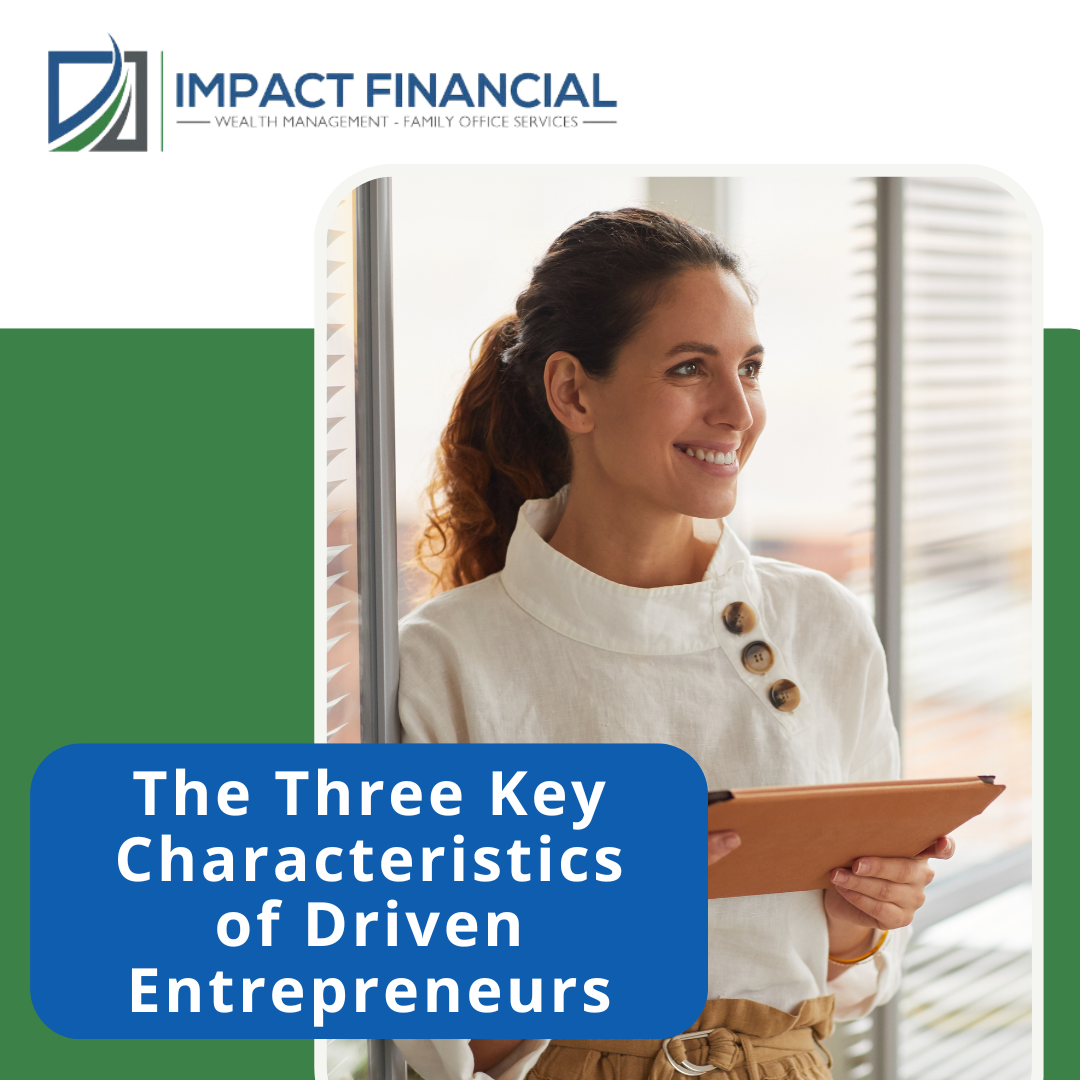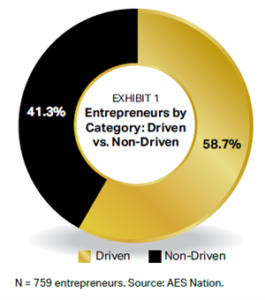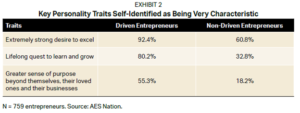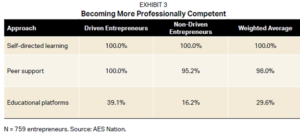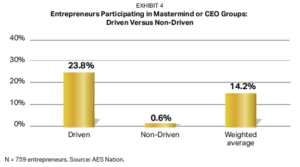Key Takeaways:
- Driven business owners are strongly motivated to excel.
- A commitment to lifelong learning and education is a key trait of driven entrepreneurs.
- Mastermind and CEO groups can help driven entrepreneurs raise their game.
Are you a driven entrepreneur—one who is truly striving to achieve tremendous success as you define it?
If so, you’ve got lots of company.
We define driven entrepreneurs as exceptionally motivated, exceptionally talented men and women who are highly committed to investing in all areas of their lives. For them, doing well means building a successful business, achieving their full potential and, in many cases, meaningfully helping other people.
To put it in a somewhat clichéd way, truly driven entrepreneurs want to be all that they can be.
And it turns out there are plenty of them. We surveyed 759 North American entrepreneurs who are senior managers (all C-level executives) and have at least a 25 percent stake in their privately held businesses. The revenues at their companies were at least $5 million annually in each of the past three years.
The result: About three out of five of the entrepreneurs in our survey can be classified as driven (see Exhibit 1).
The key traits of driven entrepreneurs
Entrepreneurs who are driven are, by definition, striving to build very successful firms. In analyzing the personalities of driven entrepreneurs, three traits really stand out—as summarized in Exhibit 2.
- Excellence. Note that more than nine out of ten driven entrepreneurs profess to being exceedingly motivated to excel. This trait is characteristic of only about three-fifths of the entrepreneurs who are characterized as “non-driven.” Many driven entrepreneurs are highly competitive and do well in challenging environments. It is not uncommon for driven entrepreneurs to have what we refer to as a calculated obsession with achievement.
- Learning. Being a lifelong learner is the second key trait, cited by about four out of five of the driven entrepreneurs. Being open-minded and curious, as well as receptive to new ideas and opportunities, can readily translate into greater business success. Driven entrepreneurs are habitually seeking to expand their knowledge and understanding as they search for ideas, information and insights they can use to continue to excel. In stark contrast, only about one-third of non-driven entrepreneurs say they’re on a lifelong quest to learn and grow.
- Larger purpose. The two groups diverge most substantially when it comes to having a greater sense of purpose beyond themselves, their loved ones and their businesses. Many driven entrepreneurs are looking to create social value—and even to change the world for the better. They are enthusiastic and determined to have a meaningful impact and leave a meaningful legacy.
Note that what makes entrepreneurs driven is not simply that they have these characteristics—but that they possess them to a much higher degree than their peers. Non-driven entrepreneurs clearly exhibit some of these traits—but not to the extent we see them in driven business owners. Driven entrepreneurs also are better at integrating these traits in ways that enhance the overall impact.
Becoming increasingly competent and successful
Most entrepreneurs are looking for ways to become increasingly competent and successful—and there are a number of ways they take action to improve their businesses, regardless of whether they are driven (see Exhibit 3).
All four of these broad-based approaches can contribute to leadership and managerial development and to effectively solving conundrums. All these approaches can effectively:
- Translate learning into the workplace, helping companies and employees accomplish greater outcomes
- Result in more self-awareness and increased motivation
- Help in developing self-confidence and self-efficacy
- Produce enhanced overall well-being
Let’s look more closely at each approach:
- Self-directed learning. Everyone surveyed engages in self-directed learning, which is a broad category covering everything from looking things up on the Internet to reading business books. Today, it is a given that when an entrepreneur has a question or is trying to better understand some topic, he or she will go out and research it.
- Peer support. It is often quite lonely growing a company. Thus, most entrepreneurs will at some point turn to their peers for support. This support can take many forms:
- Reaching out to peers with questions and concerns
- Creating formal and informal company boards, including advisory boards
- Joining chambers of commerce
- Joining trade associations
- Attending industry events including conferences and workshops
- Joining certain private clubs
- Joining mastermind and CEO groups (more on these below)
Turning to other entrepreneurs is a time-tested and powerful way for business owners to learn new things, understand how to handle obstacles and problems, and make connections that can be instrumental in moving their companies forward.
3. Educational platforms. These are executive development and management education programs, as well as specific training and professional development that is part of an educational program. While these are not tremendously popular options—only about 30 percent of entrepreneurs have used educational platforms—note that driven entrepreneurs are more than twice as likely as non-driven entrepreneurs to use an educational platform.
Spotlight on mastermind and CEO groups
As noted, entrepreneurs tend to seek out their peers to help them improve. But a great deal of this effort tends to be informal and unstructured—and ultimately, not particularly transformative.
Conversely, there are mastermind groups or CEO groups—formal, structured peer-support groups that are designed and run with the intent of helping entrepreneurs reach for the stars.
The term “mastermind group” is usually credited to author Napoleon Hill. In his book The Law of Success, Hill defined “Master Mind” as “a mind that is developed through the harmonious cooperation of two or more people who ally themselves for the purpose of accomplishing a given task.”
Today, mastermind and CEO groups are much more than a handful of people who ally themselves for the purpose of accomplishing a given task. They’re usually organized groups that consist of many business leaders and possess two main characteristics:
- They have an executive director. While the person or persons might have different titles, the executive director is responsible for running all facets of the group. Sometimes, the executive director even plays an important role in defining the group.
- Entrepreneurs pay membership fees to join. These fees range significantly, from less than $100 annually to more than $100,000 a year.
Our AES Nation research revealed that approximately 14 percent of entrepreneurs overall are members of a mastermind or CEO group (see Exhibit 4). But most important: Nearly a quarter of driven entrepreneurs are in mastermind groups.
Accelerate your success
If you want to join the ranks of driven entrepreneurs, you’d do well to adopt and hone some of their key traits—including a desire for excellence, lifelong learning and a larger purpose. CEO groups and mastermind groups can be huge allies in your efforts to foster those traits—and take your business and your life to the highest levels of success.
If you believe you’re already a driven entrepreneur, keep it up—don’t let your entrepreneurial excellence atrophy. Keep getting the education and support that will keep you on the path to achieving your biggest goals and making a dent in the universe!
Important Disclosures:
VFO Inner Circle Special Report
By John J. Bowen Jr.
© Copyright 2023 by AES Nation, LLC. All rights reserved.
No part of this publication may be reproduced or retransmitted in any form or by any means, including but not limited to electronic, mechanical, photocopying, recording or any information storage retrieval system, without the prior written permission of the publisher. Unauthorized copying may subject violators to criminal penalties as well as liabilities for substantial monetary damages up to $100,000 per infringement, costs and attorneys’ fees.
This publication should not be utilized as a substitute for professional advice in specific situations. If legal, medical, accounting, financial, consulting, coaching or other professional advice is required, the services of the appropriate professional should be sought. Neither the author nor the publisher may be held liable in any way for any interpretation or use of the information in this publication.
The author will make recommendations for solutions for you to explore that are not his own. Any recommendation is always based on the author’s research and experience.
The information contained herein is accurate to the best of the publisher’s and author’s knowledge; however, the publisher and author can accept no responsibility for the accuracy or completeness of such information or for loss or damage caused by any use thereof.
LPL Tracking #551080


